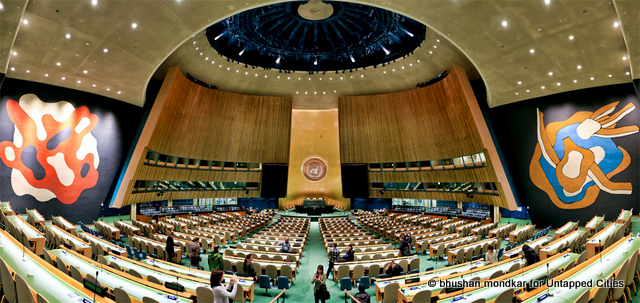Ukrainian legal practitioners visit The Hague for training in international criminal justice
Between 11–14 June, a delegation of 25 Ukrainian legal professionals travelled to The Hague to participate in training sessions to expand their knowledge and skills in the field of international criminal justice. Judges and prosecutors from district and regional courts, justices of the Supreme Court, officials of the Office of the Prosecutor General, defence lawyers and representatives of civil society organisations were among the delegation's participants.
The visit was organised by the IBA in partnership with the Ukrainian Bar Association (UBA) as part of a project entitled ‘Trial Monitoring in War Crimes Cases’. This project examines the respect of fair trial rights against international standards, with the aim of outlining best judicial practice and offering recommendations to address any shortfalls.
Over the course of the visit, participants visited Hague-based international tribunals and institutions, including the International Criminal Court and the Register of Damage Caused by the Aggression of the Russian Federation against Ukraine. Participants gained knowledge about the operations of global organisations and had the opportunity to engage with both working-level officials and high-level experts.
During training sessions, the participants explored different aspects of international criminal trials including the investigation, prosecution and adjudication of international crimes; fair trial rights and the rights of the accused, particularly during trials in absentia; the collection of open-source evidence; and the crime of genocide. Part of the study visit took place in association with the T.M.C. Asser Institute, which provided participants with sessions based on their fair trials handbook and on judgment drafting from the perspective of the right to a fair trial.
‘Building capacities in international criminal justice is crucial for Ukraine as we navigate the complexities of war crimes and ensure justice for victims’, said Viktoriia Krasnova, the UBA’s Executive Director. ‘The knowledge and skills gained from this study visit will significantly enhance legal practitioners' ability to handle these cases with the rigor and fairness they demand.’
See the full news release here.
Endangered Lawyers Data Coalition established by IBAHRI and Rule of Law Forum
The International Bar Association’s Human Rights Institute (IBAHRI) and the IBA Rule of Law Forum, alongside the American Association for the International Commission of Jurists, The American Bar Association Center for Human Rights, Lawyers for Lawyers and Wilson Williams, have established the Endangered Lawyers Data Coalition (ELDC). The aim of the ELDC is to map attacks against lawyers and the legal profession worldwide by publishing data to raise awareness and support informed responses.
There is currently no central tracking of attacks against lawyers worldwide. This knowledge gap makes it challenging to combat these concerns and protect lawyers. Seeing the challenges from their respective organisations, six entities joined together to build a secure central database to collect data on attacks against lawyers from around the world to publicly highlight concerns.
This improved information and documentation will shed light on attacks against lawyers, enabling more effective responses. Consequently, enhanced data in this area will facilitate greater support, attention and funding for lawyers who risk their lives to serve their clients, protect vulnerable voices and communities, and enhance the rule of law.
The ELDC, which was established in 2024, will build global partnerships with organisations engaged in research on behalf of persecuted lawyers in order to close the knowledge gap. The data will help in conducting research and generating metrics to highlight particular areas of need.
Visit the website here.
Torture-prevention training research in Geneva
In July, the IBAHRI travelled to Geneva to undertake further research into their capacity building training for lawyers on preventing ill-treatment. This training focused on building capacity for junior to mid-career Kyrgyz human rights lawyers to investigate, document and adjudicate cases of torture and other cruel, inhuman or degrading treatment. To do this, the IBAHRI undertook a study visit to Geneva to observe and meet with key stakeholders regarding international human rights mechanisms for the protection of victims of torture and ill-treatment.
The IBAHRI focuses on torture prevention training and technical assistance as part of its ongoing work regarding the administration of justice. Through activities like the capacity building training for Kyrgyz lawyers, the IBAHRI facilitates a holistic understanding of the use of international tools and standards and promotes prompt and impartial investigations into allegations of torture.
Read about the IBAHRI’s torture prevention work here.
Reflecting on key moments from 56th session of UNHRC

The 56th session of the United Nations Human Rights Council (UNHRC) was held from 18 June – 12 July 2024. The IBAHRI attended the session and took note of the key discussions, resolutions and outcomes and also engaged in a number of side events.
The IBAHRI, the International Service for Human Rights, alongside other organisations, delivered a statement commenting on the adoption of China’s fourth Universal Periodic Review (UPR) and raising concerns about China’s actions. China’s UPR, which took place four and a half years after its last, highlighted human rights concerns including Hong Kong’s security law and the forced sterilisation
of Uyghurs and other minorities in Xinjiang and Tibet. On 31 May, China released a report which rejected 30 per cent of the UPR’s recommendations.
The IBAHRI welcomed the adoption of the Resolution on Independence and Impartiality of Judges and Independence of Lawyers, focusing on the use of digital technologies, including artificial intelligence (AI).
At the UNHRC, the IBAHRI organised a side event focusing on the situation of women and girls in Afghanistan (and Iran). The session examined the issue of gender apartheid and the legal and political responses needed. The IBAHRI also co-sponsored a side event hosted by the Human Rights House Foundation on the rise of autocracies in Eastern Europe. The side event focused on the impact of rising authoritarianism on civic space. Another side event that the IBAHRI co-sponsored was with the International Federation for Human Rights (FIDH) on Enforced Disappearance in Ukraine: The Russian Federation's method of war.
The IBAHRI welcomed the adoption of the Resolution on Rohingya minorities in Myanmar and delivered a joint oral statement with the UN Special Rapporteur on Myanmar, the LCA, LAWASIA expressing grave concern regarding the Myanmar military’s weaponisation of the legal system to maintain power, and to perpetrate and conceal systematic human rights violations.
Read more highlights here.
Potential threats to the independence of the Colombian judiciary
The IBAHRI is concerned by a pattern of recent incidents that appear to undermine the independence of the judiciary in Colombia.
These incidents include continued derogatory comments made by President Gustavo Petro against the judicial branch and individual judges, which might have influenced the siege of the Supreme Court of Justice by demonstrators in February 2024; allegations of state intelligence surveillance of the judiciary through interception of communications; and the President’s proposed reform to the Colombian Constitution.
The President’s verbal attacks against the judicial branch are usually issued in the context of rejecting decisions impacting his proposed reforms or presidential mandate. It is to be noted, however, that none of the relevant decisions by the High Courts of Colombia have been reported to be in contrast with the country’s constitutional order. Such derogatory statements not only have the potential to intimidate judges, interfering with their ability to carry out their duties without fear of repercussions, but they also impact the public’s perception of the independence and impartiality of the judiciary.
In March 2024, President Petro started discussing a proposal to change the Constitution after the opposition-controlled Congress failed to approve elements of his reform agenda. In a scenario of high polarisation and tensions with the judiciary, any attempt to reform the Constitution creates an institutional alert and deserves the strictest scrutiny in terms of appropriateness and conformance with constitutional procedures.
Read the full statement from the IBAHRI here.
IBAHRI condemns the sentencing of Wall Street Journal journalist Evan Gershkovich

The IBAHRI strongly condemns the 19 July sentencing of Evan Gershkovich, an American journalist for the Wall Street Journal, by a Russian Court in Yekaterinburg to 16 years in prison on espionage charges. The reporter’s arbitrary detention and conviction pose serious threats to media freedom and the security of journalists.
Mr Gershkovich was arbitrarily detained by the Russian federal Security Service on 29 March 2023. He was accused of gathering information amounting to ‘state secrets’ on the order of the United States government. He denies the allegations.
IBAHRI Co-chair and Immediate Past Secretary General of the Swedish Bar Association, Anne Ramberg Dr Jur hc, commented: ‘The persecution, wrongful arrest, detention, “trial” and sentencing of Evan Gershkovich is a shameful marker of the crackdown on free expression in Russia. […] The IBAHRI urges the Russian authorities to reverse this outcome without delay’.
Image: use image from news release, https://www.ibanet.org/IBAHRI-condemns-the-sentencing-of-Wall-Street-Journal-journalist-Evan-GershkovichThe IBAHRI strongly condemns the 19 July sentencing of Evan Gershkovich, an American journalist for the Wall Street Journal, by a Russian Court in Yekaterinburg to 16 years in prison on espionage charges. The reporter’s arbitrary detention and conviction pose serious threats to media freedom and the security of journalists.
Mr Gershkovich was arbitrarily detained by the Russian federal Security Service on 29 March 2023. He was accused of gathering information amounting to ‘state secrets’ on the order of the United States government. He denies the allegations.
IBAHRI Co-chair and Immediate Past Secretary General of the Swedish Bar Association, Anne Ramberg Dr Jur hc, commented: ‘The persecution, wrongful arrest, detention, “trial” and sentencing of Evan Gershkovich is a shameful marker of the crackdown on free expression in Russia. […] The IBAHRI urges the Russian authorities to reverse this outcome without delay’.
Read the full news release here.

